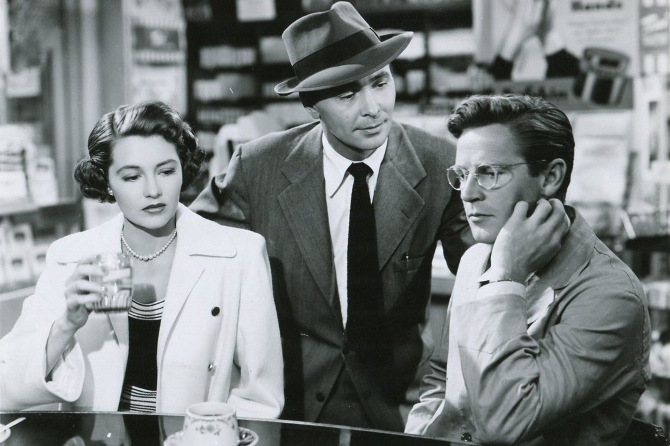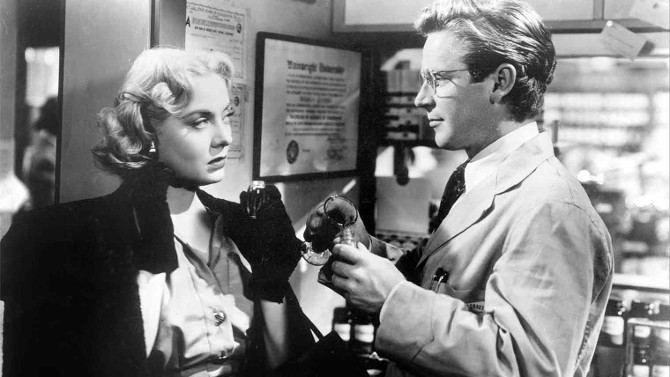You’ve gotta love a great film noir opening: “I’m Collier Bonnabel. I’m a cop. I’m a lieutenant detective in, uh, Homicide. That’s a fancy name for murder. We get plenty of tough cases. Solved most of them, sure. But how? I only know one way, one thing that breaks them wide open. Tension. I work on people, on suspects. Play up to them. Play up to their strengths, pour it on their weaknesses. Romance them or ignore them. Kiss them. Press them. But whatever way. . . keep stretching them. And when they get stretched so tight they can’t take it any longer: TENSION.”
1949’s Tension, directed by John Berry, is narrated by Bonnabel (Barry Sullivan) – a hard-boiled, driven narrative that provides us with an intimate view into the detective’s mind. After this intriguing monologue (in which he speaks directly to the camera while playing with a rubber band), Tension opens with a prototypical film noir shot – a nighttime big city street, neon lights flashing, a pharmacy the main focal point.
Inside, a man works – Warren Quimby (Richard Basehart) is the all-night manager and pharmacist for the store. . . a short in stature, spectacle-wearing average guy. At the food counter, his wife, Claire (Audrey Totter), a blonde bombshell who could stop a fast moving train in its tracks. . . only problem is, a jarring immediate stop like that always brings with it pure destruction.
Desperate to hold onto his dame (Claire could wrap even the most pious gentleman around her pinky finger), she is the type of gal who heads out on the town with wealthy men. . . when she should be in bed sleeping. Her most recent fling is Barney Deager (Lloyd Gough), a bigger than life, mid century modern ocean living guy, a man who quickly wins the moving a mile-a-minute femme over – dashing Warren’s post-war dream of moving to the suburbs and having a litter of cute kids.
With Warren beaten – spiritually, mentally, and physically (Deager roughs him up when he tries to win Claire back), he dejectedly turns to the friendly, pharmacy-working soda jerk, Freddie (Tom D’Andrea), for a kind ear. . . the employee getting so riled up during the story, he claims he would have killed Deager if it were him.
Planting a seed in the pharmacist’s head, Warren starts to plot his revenge, creating a new persona, Paul Sothern (he pulls the name from a movie magazine that features Ann Sothern on the cover – Tension’s producer Robert Sisk was already starting to prep for his next project, Shadow on the Wall, a film in which Ann Sothern was hired as the lead), purchasing flashy clothing, contact lenses, and a new apartment to construct the facade of a wholly different person living in the city.
Complicating things, he meets Mary Chanler (Cyd Charisse), a pretty girl next door type. . . perhaps not as va-va-voom sensuous as his wife, but she is a wholesome, caring woman, well worth taking the time to get to know. Living two very different lives, will Warren go through with his plan to murder his wife’s new lover? Could he have a change of heart and start a new life with Mary?
In what seems like it will be a pretty predictable affair, screenwriter Allen Rivkin (based on the story by John D. Klorer) muddies the waters, taking unexpected turns at every four way stop – throw in some red herrings to boot, and you’ve got some really suspenseful twists.

From left to right: Mary Chanler (Cyd Charisse), Police Lt. Collier Bonnabel (Barry Sullivan), and Warren Quimby (Richard Basehart) – the plot thickens in the twenty-four hour pharmacy
Playing with the most iconic of tropes of the noir genre, Berry’s Tension features fascinating acute voice over narration, oodles of style (my favourite sequence finds Mary turning the bulb off in a phone booth, hiding in the shadows while nerve-racking things happen in the twenty-four hour pharmacy), harsh use of shadow and light (director of photography Harry Stradling Sr.’s lighting so distinctive that the black and whites often look like stunning linear wallpapers in the background), ever changing allegiances, and arguably, one of the great femme fatales in film history. . . Totter game for all of it. With perhaps the most sultry score ever written for a dame (pure perfection from composer André Previn), every time Totter walks onscreen, she makes waves (her alluring low voice and knowing looks an invitation for a fun time. . . and trouble down the road). . . it doesn’t hurt that she is dressed in tight fitting blouses, a little black swimsuit and other hip hugging attire. Just in case you haven’t figured out her type, this sharply written quote should give you an idea, “so, I got a file on you that goes further than you’d like to remember. . . and up to where you wish you could forget”. The utter opposite, Charisse’s Mary is a good girl, a nurturing, big hearted gal who will stick by her man, through thick and thin. There is a wonderful duality to the two women. As for the men, Basehart is a gem in his own dualistic way – glasses wearing Clark Kent at one moment, to handsome leading man with the willpower to do whatever it takes, the next. While Gough’s Barney Deager and Sullivan’s Lieutenant Bonnabel are so tough to read. . . men who act fast, often without a thought of his fellow man. Bonnabel’s partner, Police Lieutenant Edgar Gonsales (William Conrad – yes, Cannon from the 1970s television show) must also be mentioned. . . though his character could have been fleshed out a bit more, he makes the most of his screen time, a man who constantly seems to be hungry (a little investigative montage finds him grabbing popcorn and coke – always foiled by his partner in regards to starting, or finishing, his snacks).
For film noir fanatics, it will be wise to remember the phone booth I mentioned earlier, for when you visit Anthony Mann’s entertaining 1950 crime feature Side Street, Farley Granger enters the same pharmacy set, using the same phone booth, but this time, the goal is actually to make a call (not hide in the shadows).
A noteworthy noir that captures a certain post-war disillusionment, it is a shame that, soon after, Berry was forced into self-exile during the Hollywood blacklist (Red Scare) era, as he was named as a Communist (by Edward Dmytryk and Frank Tuttle); called to testify, he knew pleading the 5th would signify guilt, so he left for France and lived there for the next twelve years. After Tension, he made a short documentary, The Hollywood Ten (about the ten directors and screenwriters who challenged the House Un-American Activities Committee – this probably didn’t help), as well as another film noir, He Ran All the Way – he would not direct another American movie for twenty-three years. So, for some prime examples of rocky relationships, track down Tension – you won’t be implicating yourself.

